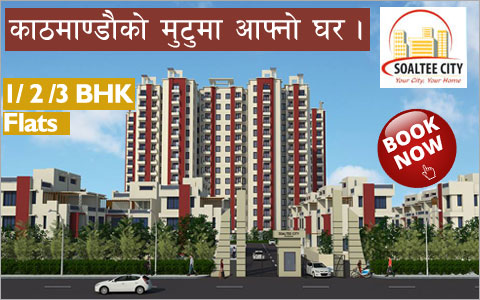National News

With development work being down sized, the business of construction equipment has also heading southbound. According to entrepreneurs, the business has dipped to more than 50 per cent compared to 2009-10.
“The major cause for decrease in business is the budget not being introduced on time this fiscal year,“ blames Tanka Bhatta, assistant general manager at Continental Trading Enterprises, an authorised distributor for Komatsu. Bhatta further says, “The demand for construction equipment like excavators, loaders, rollers, backhoe loaders, wheel loaders, et cetera -especially used for big development projects -have dipped significantly due to lack of budget.“
Although, Nepal has potential market for construction equipment, he says that political instability is the other main hurdle to the business. “Nepal is a developing nation and there is still a lot of room for infrastructure development like transportation, hydro power, mining, among others, which increases the scope of the machinery in the country,“ he explains.
The company claims Komatsu is the pioneer in providing excavation equipment in Nepal. Bhatta says that they enjoy 70 per cent market share for excavators. Stating that last fiscal year 2011-12 was the worst of all, he says, “Though we witnessed 20 to 25 per cent boost this year against last year, it is insufficient.“ The company states that they sell 40 to 50 units of excavator, dozers and motor loader per year on an average.
However, Sanjiv Deuja, marketing manager of Morang Automobile Workshop (MAW) JCB, states that since last seven months, they are witnessing growth in the business. “The road expansion drive proved to be a boon for our business as most contractors as well as the department for roads approached us for back loaders.
This is why our sales were boosted from 10 to 15 units per month to 30 to 35 and sometimes the number was up to 40 units per month,“ informs Deuja.
Stating that the market is getting more and more competitive, Deuja says, “Since the last two years, there are many companies and brands emerging in Nepali market. Brands like Komatsu, Case, Caterpillar and Tata are our competitors whereas Doosan, Hyundai, Kawasaki, Mahindra and Ashoka also have introduced construction equipment. Few other brands are also planning to enter the market.“
Time and cost effectiveness along with convenience are the prime reasons for construction equipment being hired and bought. Industrialists state that the major chunk of their clientele for equipment are contract ors, while real estate developers, hydropower and mining projects, government departments like the department for road, department of irrigation, brick in-dustrialists, et cetera also opt for their equipments.
There is also an increasing trend to invest in construction machinery and lease them out for profit. Bhai Raja Maharjan, director of Akshovya Construct ion Pvt Ltd -the company that leases construction equipments -says, “These days we only have 25 per cent of the business we had some five years ago. Hence, most of our equipment is now gathering dust.“ He says with many players in the market, there is fierce and often unhealthy competition. He further adds, “As the business scenario is getting tougher, the investment is being seized and filtered. I think within two years, the situation will be corrected.“
The prime time for the business is April to August, while the rainy season is the off season for the business. Accord ing to Maharjan, lack of petroleum products and traffic congestion are other problems facing the sector. Agreeing with him, Deuja says, “Contractors have to stock up on petroleum to be able to conduct the work smoothly. But many times storing oil for a long time results in its contamination and there have been cases of machinery breakdowns because of it.“ He also informs that due to lack of transportation facilities in rural areas, many times they are unable to provide after sales service, which then impacts the projects' operations.
To solve the problems, industrialists stress on the need for a stable government in the country. “If there is a stable government and it introduces development plans and policies, not only this sector but the whole nation will stand to benefit,“ opines Bhatta. He further says that government should also focus on attracting foreign direct investment in the sector.
?
source: the himalayan times,27 April 2013
- 9th Nepal Buildcon International Expo 2024
- Real Estate Expo 2023
- NRB raises housing loan limit to encourage home constructions
- Nepal Rastra Bank (NRB) Monetary Policy 2080-2081
- New Price of Land in Kathmandu Metropolitan City, Nepal
- Capital Gains Tax Rate on Real Estate Transactions in Nepal 2080-81 ( 2023/24 )
- Kathmandu metropolis implements free parking policy for commercial buildings and hospitals

![[X]](https://www.housingnepal.com/images/popup-close-button.png)











































































































































































































































































































































































































































 Facebook
Facebook
 Delicious
Delicious
 Digg
Digg
 Reddit
Reddit
 Stumble Upon
Stumble Upon









